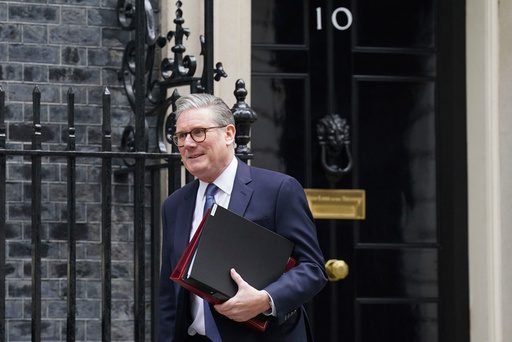LONDON (AP) — British Prime Minister Keir Starmer on Saturday directly challenged Russian President Vladimir Putin to agree to a ceasefire in Ukraine if he is genuinely committed to peace. Starmer also announced that Western allies are intensifying pressure on the Kremlin, including advancing peacekeeping force plans to an “operational phase.”
Following a two-hour virtual meeting with what Starmer referred to as the “coalition of the willing,” he criticized Russia’s “dithering and delay” in response to U.S. President Donald Trump’s ceasefire proposal and condemned Russia’s “continued barbaric attacks” on Ukraine.
“The ball is now in Russia’s court,” Starmer declared. “President Putin must prove he is serious about peace and sign up to a ceasefire on equal terms.”
The meeting included around 30 leaders, such as French President Emmanuel Macron, Italian Prime Minister Giorgia Meloni, Ukrainian President Volodymyr Zelenskyy, and leaders from Australia, Canada, and New Zealand. Officials from NATO and the European Union were also present.
Military Support and Peacekeeping Plans
Starmer emphasized that all participants reaffirmed their commitment to Ukraine’s long-term security and agreed that Ukraine must be able to defend itself against future Russian aggression. He revealed that military planners would reconvene in the U.K. next Thursday to develop concrete plans for supporting Ukraine’s security.
Without revealing specifics, Starmer confirmed that allies are prepared to deploy troops to Ukraine to secure peace after a ceasefire. The U.K. and France have been pushing for a European military force to support Ukraine and deter future Russian attacks.
“We will strengthen Ukraine’s defenses and armed forces and be ready to deploy as a ‘coalition of the willing’ to protect Ukraine by land, sea, and air,” Starmer stated.
Push for an Unconditional Ceasefire
The meeting followed the U.S. proposal for a 30-day ceasefire in Ukraine, which Zelenskyy has backed. However, Putin has attached several conditions before agreeing to the truce.
Starmer praised Ukraine’s acceptance of an unconditional ceasefire, calling it a clear indication that “Ukraine is the true party of peace.” Macron echoed this sentiment, saying Ukraine’s support for the ceasefire showed “courage.”
Macron criticized Russia for not showing genuine interest in peace and for escalating attacks ahead of potential negotiations. “This is when our strategy of peace through strength comes into play,” he said. “If we want peace, Russia must respond clearly, and pressure must be applied in coordination with the U.S.”
Zelenskyy called for tougher sanctions on Russia to force Putin into accepting the ceasefire. In a series of posts on social media, he stated that a 30-day ceasefire would create an opportunity for genuine peace talks.
Zelenskyy also supported the idea of a European peacekeeping force in Ukraine, backed by the U.S. “If Putin wants to invite foreign forces to Russian territory, that’s his choice. But he has no right to decide on Ukraine’s security,” he said.
Trump’s New Approach to the War
The U.S. has shifted its stance on the Ukraine war since Donald Trump returned to the White House. Unlike President Joe Biden’s administration, Trump has shown limited support for long-term security arrangements involving U.S. military backing.
However, Trump expressed optimism on Friday that Putin would support the ceasefire. “I’m getting some pretty good vibes from Russia about a ceasefire and eventually a deal,” Trump said.
Germany’s Chancellor Olaf Scholz welcomed Zelenskyy’s willingness to agree to an unconditional truce and acknowledged the importance of U.S. leadership in the peace process.
With Russia gaining momentum on the battlefield, analysts believe Putin may be reluctant to accept a ceasefire while holding the upper hand. However, Starmer urged Putin to seize the moment and end the violence.
“Sooner or later, Putin will have to come to the table,” Starmer said. “Now is the time to silence the guns, stop the barbaric attacks, and agree to a ceasefire.”

 English
English



























































